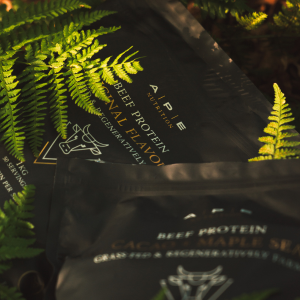In this article I cover three key ways in which stress can impact nutrition and delve into my favourite tools for mitigating stress.
Being able to appropriately manage stress is so important to ensure you can access all the healing and growth properties the food you're eating has to offer.
1) Optimising digestion through accessing a parasympathetic state
It’s not just about what you eat, it’s also about what you can absorb and digest. When our bodies are in a sympathetic (flight or freeze) state, it’s not a good time to eat. To properly absorb and digest your food, you need to be in a parasympathetic (rest and digest) state.
Why is this important?
We create our muscles, tendons, ligaments, hormones, neurotransmitters, etc from what we eat. If you’re looking to operate optimally; for your brain to be sharp, for your muscles to grow stronger, for your emotional state to be stable ABSORBING & DIGESTING high quality foods is a major factor.
Due to modern society (this is especially prevalent with what’s going on in the world right now), the general base level of stress is high. I’m seeing a lot of people living a huge portion of their lives oscillating between a high and low sympathetic state, rarely dropping into parasympathetic.
There are loads of ways to access a parasympathetic state and I encourage everyone to develop a practise and be disciplined in using it when it’s needed.
Practices could be breathwork, meditation, light movement (stretching, yin yoga), music, getting out in nature or all of the above.
Personally before I eat I take three deep breaths with my eyes closed. I make my exhale double the length of my inhale (breath in for four and out for eight). This imitates a sigh, (which we do naturally to calm ourselves) and helps encourage the body into parasympathetic.
I’ll also aim to listen to something instead of watching tv. When watching tv, especially something intense, our mirror neurones will knock us straight back into sympathetic. Our brain in its search to read the situation around us will pick up on the car chase or the football match and replicate it in our biology. This isn’t what we want when the primary goal is to access the healing and growth properties in our food.
2) Manage cortisol & ghrelin to control hunger & cravings
Usually when people think of stress, they think of psychological stress; getting cut up in traffic, messing up at work or having an argument.
Although these are all definite forms of stress, the majority of stress in modern society comes in ways a lot of people don't consider; lack of sleep, poor diet, over / under-eating, environmental toxins, exercising when stress is already high, etc.
Your body can't tell the difference between a disagreement with your boss, a junk food binge or staying up until 1am watching tv. To it, they're all just stress on the system.
When your bodies allostatic (total) stress load is high, this releases the hormone cortisol. When the human body is functioning optimally, cortisol should be high in the morning, providing us with drive for the day ahead and then reduce throughout the day ready for you to fall asleep at night.
However when this natural cortisol rhythm is disrupted, one of the outcomes is increased ghrelin.
Ghrelin is commonly referred to as the hunger hormone and has been associated with increased consumption of 'comfort' food and obesity.
Stress is an inevitable part of life. Therefore, it's so important to have practises, to reduce the allostatic load of stress on the body.
One of my favourite practises for this is mediation. To help you combat this, we've uploaded a free meditation for stress relief to our YouTube channel.
3) The insulin-cortisol seesaw.
Imagine cortisol as a milder form of adrenaline. It's a hormone, which gets released when we're under stress to give us the energy to fight or run. Throughout the majority of human history, this was extremely necessary for survival. If we came across a bear in the woods, cortisol would have played a major role in helping us escape the danger. However, in modern society, cortisol is being released constantly due to poor food choices, environmental pollution, stressful jobs, relationships, etc.
As human's we're designed for cortisol to be released acutely (now and again) as opposed to chronically (all the time).
Cortisol and insulin are referred to as seesaw hormones, when one spikes, the other drops. Our bodies understand this on an unconscious physiological level. That's why when you're feeling stressed out, you'll find yourself reaching for that sugary treat. Your body knows that when the sugar hits your bloodstream, your pancreas will release insulin to shuttle it away and in doing so this will reduce your cortisol levels.
However, this is a very short term fix and that sugar will likely end up getting stored as fat. Also, it's well documented that high insulin loading will further stimulate cortisol. So that tub of ice cream you just downed may be relieving some stress right now but it may well be the beginning of a negative repetitive cycle of high insulin followed by high cortisol.
Unless this cycle is broken and things are brought back on track, it will lead to poor metabolic health, weight gain and ultimately some form of chronic disease.
So what's the answer?
Well firstly, now that you have this understanding, you'll be able to recognise when this happens to you next. When it does, you can opt for a carbohydrate option lower on the glycemic index or just be conscious not to overcome carbs. This will help mitigate some of the cortisol through the process described above, without overdoing it and causing a further cortisol spike. Pair this with some of the practises I've talked about above (meditation, breath work, stretching, etc) and you'll be sweet.
Stress is a reality of modern society. Unless you're planning on becoming a Shaolin Monk and moving to a cave somewhere it's so important that you focus on proving your body with proper nutrition and implement some stress management tools in to your life.
Please let me know if you have any questions in the comments below.
Thanks for reading,
Josh






